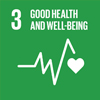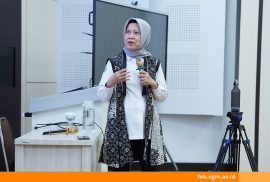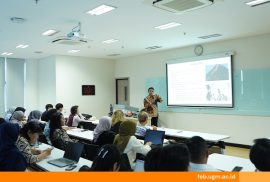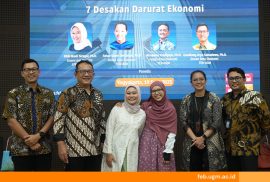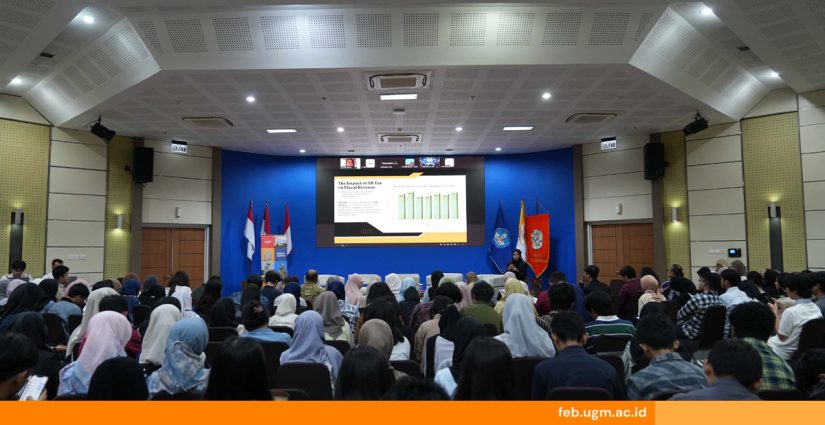
Sugary drinks have long been a favorite among many Indonesians. Their sweet taste and relatively low price make them highly accessible. Yet, do you know that excessive consumption of sugary drinks brings significant harm, not only to individual health but also to the country?
To advocate for healthier lifestyles and curb diabetes cases, especially among youth, the Center for Indonesia’s Strategic Development Initiative (CISDI), together with Universitas Gadjah Mada’s Faculty of Economics and Business (FEB UGM), Faculty of Law (FH UGM), and Health Promoting University (HPU UGM), organized the CISDI Goes to Campus (CGTC) event. Carrying the theme “Sweet but Risky: Unpacking the Impacts of Sugary Drink Taxation on Economy, Health, and Law,” the event was held onsite at the 8th Floor FEB Learning Center, on Tuesday (23/09).
The interactive talk show featured several speakers: Dr Novat Pugo Sambodo, S.E., MIDEC (Lecturer in Economics, Faculty of Economics and Business, Gadjah Mada University), Dr Arvie Johan, S.H., and M.Hum. (Lecturer, Faculty of Law, Gadjah Mada University), and Nida Adzillah Auliani, S.Gz., M.Sc. (Project Lead Food Policy CISDI), who discussed the importance of MBDK excise from a health, economic, and legal perspective. Through this event, the awareness and knowledge of the academic community, especially students, regarding the dangers of long-term MBDK consumption can be increased. Beyond promoting a healthy lifestyle, this tax policy is a crucial strategy to alleviate the financial burden on the state caused by the rising prevalence of non-communicable diseases in Indonesia.
Chair of Health Promoting University (HPU UGM), Prof. Dra. Yayi Suryo Prabandari, M.Si., Ph.D., expressed her appreciation for the initiative. She emphasized how relevant the issue of sugar-sweetened beverage (SSB) taxation is within the university setting, not only for students but also for lecturers and staff who also need to maintain a healthy lifestyle. She highlighted the high trend of sugar consumption, particularly high-sugar packaged drinks, whose negative impacts often only become evident in the long run. “Today’s discussion will be beneficial in enriching our knowledge and awareness, not only from a health perspective but also from legal and economic points of view. Hopefully, this event can help accelerate the implementation of SSB taxation in Indonesia,” she remarked in her address.
Project Lead for Food Policy at CISDI, Nida Adzillah Auliani, S.Gz, M.Sc., explained that excise tax is a state levy on certain goods that have negative impacts, which is why it is often referred to as a “sin tax.” In the context of SSBs, taxation encourages reduced consumption while pushing the industry to adapt by producing healthier beverages.
Nida further elaborated on the urgency of SSB taxation in Indonesia. The country currently ranks fifth globally in the number of adults living with diabetes, with 20.4 million people affected in 2024. Moreover, in the past 15 years, the number of people with obesity has doubled, reaching 23.4 million in 2023. A 2025 CISDI study revealed that about 68% of Indonesian households consume at least one type of SSB weekly. This underscores the role of sugary beverages as a major contributor to non-communicable diseases (NCDs) such as diabetes.
Nida explained the financial burden on the state is also significant. BPJS Kesehatan’s spending on catastrophic diseases linked to obesity, diabetes, and hypertension rose by 43% or equivalent to IDR 6–10 trillion. This is because regular SSB consumption can lead to weight gain, which leads to obesity, and eventually increase the risk of chronic conditions such as diabetes and hypertension, which, if left unchecked, will further strain the country’s healthcare budget. Thus, through taxation, the price of SSBs is expected to increase, lowering consumption levels or encouraging the industry to innovate with healthier products.
A study conducted by CISDI in 2025 projected that a 20% tax could reduce SSB consumption by up to 18%. The same projection estimated that the policy could prevent 3.1 million new cases of type 2 diabetes and 455,000 diabetes-related deaths by 2033. Moreover, from an economic standpoint, it could also save the country IDR 40.6 trillion in productivity losses by the same year.
Globally, SSB taxation is not new. Around one hundred eight countries have adopted it through three main models, ad valorem (a percentage of product price), volume-based, or sugar-content-based. Meanwhile, idea has been on the table in Indonesia since 2020, but only in 2025 did the government confirm that implementation would begin next year.
Consultant at the Center for Policy Studies and Advocacy on Sustainable Development Inc. in the Philippines, Maria Fatima “Jofti” A. Villena, shared her country’s experience to provide a comparative perspective. The Philippines first introduced an ad valorem tax of 10% on soft and carbonated beverages in 2013. Then, in 2018, it launched a new scheme under the TRAIN Law (Tax Reform for Acceleration and Inclusion), which imposed a specific tax based on volume. However, Jofti noted that the policy’s effectiveness has declined because rates were adjusted only once and failed to account for annual inflation on price. As a result, the Philippines now faces challenges similar to Indonesia, particularly the high mortality rate linked to SSB-related illnesses.
Reportage: Najwah Ariella Puteri
Editor: Kurnia Ekaptiningrum
Sustainable Development Goals

